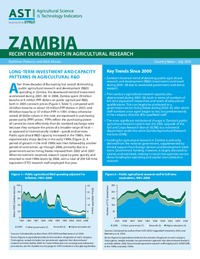Authors:
Flaherty, Kathleen; Mwala, Mick
Year:
2010
Publisher
International Food Policy Research Institute (IFPRI)
Back to:
Long-term trends indicate a serious decline in investment in agricultural R&D in Zambia. Public agricultural R&D spending fell to an historical low of 18 billion kwacha or 7 million PPP dollars in 2005 (both in 2005 constant prices), compared with 52 billion kwacha or 22 million PPP dollars per year on average during the 1990s. Although expenditures recovered slightly in 2007, spending was still low in 2008.
The combined effects of a government-sector hiring freeze and lack of training opportunities resulted in significant erosion of research staff capacity. Although staffing levels increased to 209 FTE researchers in 2008, the composition shifted towards junior rather than senior researchers, meaning those holding BSc rather than PhD degrees. ZARI was particularly affected by a reduction in the number of PhD-qualified researchers.
In addition to training and capacity limitations, ZARI and the other government research agencies have also faced challenges in supporting the operating and capital costs associated with research. A number of needs have been identified at ZARI, such as infrastructure, laboratory equipment, communication facilities, and vehicles. Delays and reductions in the disbursement of budgeted funding from both the national government and foreign donors continue to constrain the efficient management of research funding.
Although GART has been successful in generating funding through the sales of goods and services, as well as attracting donor funding and strengthening linkages with UNZA, other trusts within the nonprofit sector have not fared as well. They were originally created for the purpose of increasing the flexibility and efficiency of research funding and management, in addition to promoting public–private partnerships. They, however, still depend on national government funding and have yet to meet the expectations of their mandate.
Although the recent rise in the number of agricultural researchers is positive—as is the upgrade of ZARI to a ministerial department, and increased investment under ADSP since 2007— Zambia’s agricultural R&D agencies are still contending with the effects of long-term underinvestment and continue to struggle with funding issues that hinder their ability to contribute more effectively to the country’s agricultural and economic development.

